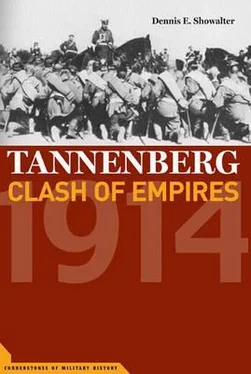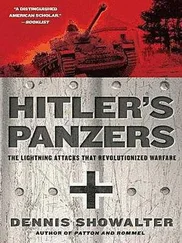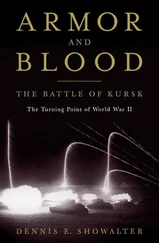Schlieffen’s strategic conceptions incorporated his reflections on the changing nature of war. Often derided for their shortsightedness in failing to predict a war of attrition, Europe’s generals were if anything even less correct in evaluating the pace of destruction in modern war. Far from being technological illiterates, soldiers were well aware of what modern weapons, the rapid-firing field gun, the machine gun, and the magazine rifle, could do in theory. What they were expecting was not a gentlemen’s war, not a repetition of 1866 or 1870, but an Armageddon in quick time, with events proceeding at the outer limits of comprehension and control. I. S. Bloch’s La guerre future was not only discounted because of its pessimistic predictions of indecisive mass war. More and more experts agreed that the rates of loss under modern conditions made a war of attrition on the Bloch model impossible.
Military planners prior to 1914 are often described as underestimating the resilience of their war machines and the societies sustaining them. What they actually did was to overestimate the rates at which men would be killed and machines destroyed. They saw vulnerabilities more clearly than durabilities—and it was the latter that gave Europe time to adjust to the initial casualty rates of 1914–15. Given the nature of prewar anticipations, it by no means indicated lack of faith in one’s people to assume that countries facing such a catastrophe were likely to collapse from psychic shock and physical stress. Schlieffen was hardly isolated in his growing belief that the armed forces available to modern nations could be maintained for any length of time only at the expense of the economic, social, and political institutions they were supposed to sustain. And in this context Russia, combining tremendous reserves of human and material resources with a relatively primitive social structure, emerged as the most likely survivor of a protracted war. 68
The essence of strategy is the calculating of relationships among ends, means, and will. Let the process of calculation obscure the values of the relationships, and the result is not bad strategy but no strategy. 69Neither the German Empire’s power nor the German Empire’s finesse was sufficient to establish her as the focal point of European diplomacy during the Bülow years. Instead, Germany remained one power of several—at the very time when increasing concern for her military position generated a corresponding policy of Flucht nach vorne. The German army in the years before 1914 became increasingly concerned with processes, methods, and techniques. Arguably, Schlieffen’s essential flaw as a strategist was his acceptance of Germany’s international position as defined by civilian political authority. He responded with a desperation move: a staff college tour de force, but a military myth requiring everything to go impossibly right to have a real chance of succeeding.
“Everything” included political and diplomatic factors, which between 1905 and 1914 became increasingly subordinated to this gambler’s gambit. The Schlieffen Plan, however, had one supreme psychological virtue. It offered hope through diligence. If everyone did his bit and played his part, the Empire might have a chance. The plan’s rapid evolution into dogma owed much to the increasingly narrow perspective of German military thinking. But that development in turn represented in large part a response to a paradox. The Imperial army was given—and accepted—the task of planning for a war which its own calculations suggested might well be so destructive as to be unpredictable, uncontrollable, and ultimately unwinnable. In this context, a withdrawal into procedures, a concentration on mobilization schedules and corps-level tactics, was natural if not exactly inevitable. The Schlieffen Plan was a sophisticated security blanket. Had it not existed its equivalent would almost certainly have been designed.
The climate of anxiety in Germany was reinforced by a new set of public slanging matches with Russia. In the agonizing reappraisals that followed the Peace of Portsmouth, Germany bore the brunt of the blame in St. Petersburg for encouraging Russia’s disastrous Far Eastern policies. Even Witte criticized Berlin for “forcing” Russia to pursue her arms in Manchuria rather than closer to home. Holstein was not being blindly Russophobic when he acidly described “Russia of the Russians, where the ‘inevitable’ war with Germany is discussed in every Zemstvo … even if a treaty actually existed between Russia and Germany, the popular prejudices of the Russian people would today probably override it.” 70
Russia’s increasing and unexpected postwar rapprochement with Britain generated corresponding despondency in the German foreign office. Both powers had significant reasons for settling their imperial rivalries. Britain was unwilling to maintain the land forces necessary to project her power into the Middle East and central Asia in the face of Russian opposition. Russia for her part needed above all a period of stability in international affairs. These positive factors drew Britain and Russia together independent of anything Germany was able to do. With France as an enthusiastic go-between, the Anglo-Russian entente of 1907 quickly emerged as something more than just another paper agreement. 71
Both powers were concerned to reassure Germany that their improved relationship was not aimed at her. In his annual reports for 1906 and 1907 Ambassador Sir Arthur Nicolson was impressed by the “intimate and cordial” relations between Russia and Germany’s courts and governments—relations he ascribed both to the unusual skill with which Germany managed her Russian affairs, and by the absence of direct points of friction between the empires. In the European field, he declared, “there is a desire on the part of the Russian Government to live on the best possible terms with Germany.” 72Nevertheless, no interpretation of the entente as a “warning,” a structure aimed at containing a provocative and insatiable German diplomacy, can deny the objective reality of encirclement. Even Fritz Fischer concedes that Germany after 1907 “lived permanently under the threat of a war on two fronts.” The continued failure to negotiate a naval limitation treaty with Britain set the seal on Germany’s isolation. The Bosnian Crisis of 1908 demonstrated its consequences. 73
2
The Center Fails to Hold
Russo-Austrian cooperation in the Balkans was always more a matter of interest than principle. When Count Alois Aehrenthal became foreign minister of Austria-Hungary in 1906, he was concerned with what he considered the empire’s negative approach to foreign policy. Austria, Aehrenthal argued, must begin to act instead of reacting—not least to maintain its credibility with her German ally and her Russian collaborator. Aehrenthal even entertained hopes of reviving the Three Emperors’ League, this time with Austria as its pivot. His dreams, however, were fettered by Austria’s economic and military weaknesses. Lacking the resources to back an overt forward policy, Aehrenthal sought instead an opportunity to achieve a triumph through negotiations. The most likely field for such negotiations appeared to involve confronting the Balkan problem, specifically, the increasingly hostile attitude of Serbia. The newly established Russophilic dynasty in Serbia was combining with increasingly vocal Slavic movements in Macedonia and Austria-Hungary itself to generate increasing concern for the Habsburg Empire’s viability.
Russia could not ignore the fate of what had become the principal Slav state, and certainly the noisiest one, in the Balkans. Neoslavism, with its emphasis on creating a league of independent Slavic states under Russian protection, was at the peak of its short-lived influence in Russian liberal circles. Conservatives and patriots were hostile by reflex to anything that might extend Habsburg influence in southeast Europe. Realists were influenced by the fact that Russia’s western and southern frontiers were overwhelmingly populated by non-Russians whose disaffection had been made all too plain in the revolts of 1905. From Finland to the Caucasus, this unstable border correspondingly encouraged the formation of buffer zones and client relationships wherever possible. And the tsar’s new foreign minister, Baron A. P. Izvolsky, also appointed in 1906, was just the man to bring the kettle to a boil.
Читать дальше












